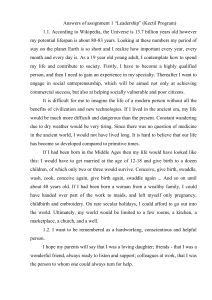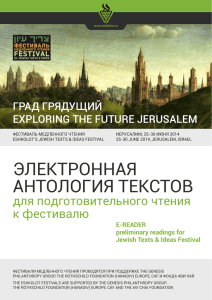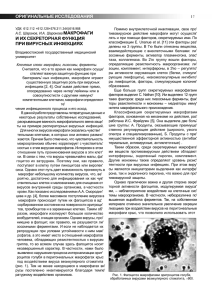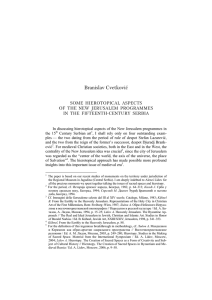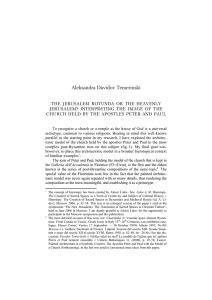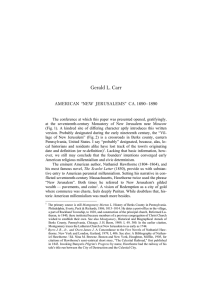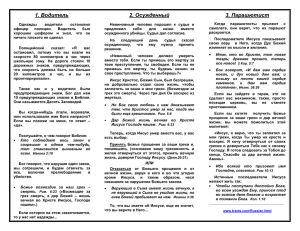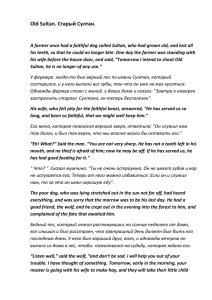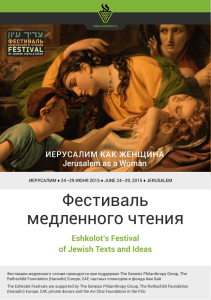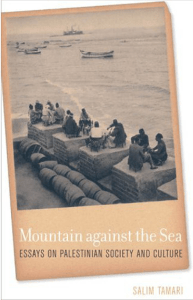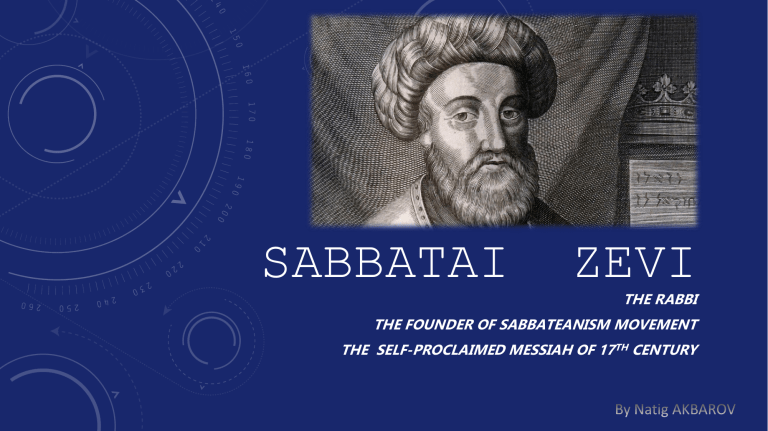
SABBATAI ZEVI THE RABBI THE FOUNDER OF SABBATEANISM MOVEMENT THE SELF-PROCLAIMED MESSIAH OF 17TH CENTURY EARLY LIFE Sabbatai Zevi was born in Smyrna, Ottoman Empire (İzmir in present-day Turkey) in 1626. His father Mordecai Zevi was first a Poultry dealer. Then Smyrna became the center of Levantine trade and Mordecai became the Smyrna agent of an English trading house and managed to achieve some wealth in this role. Sabbatai attended a yeshiva under the rabbi of Smyrna, Joseph Escapa. His studies of halakha (Jewish law) did not appeal to him, but apparently Zevi did attain proficiency in the Talmud. On the other hand, he was fascinated by mysticism and the Kabbalah, as influenced by Rabbi Isaac Luria. Believed in English Theory of Millennialism that was also pointing out to a mystic Messiah that will come in 1000s years. At the age of 20 he was already married twice. But due his ultra acetic lifestyle his marriages did not last long. Everyone who knew him admired, respected and appealed to his wisdom, behavior, knowledge and influential personality. TRAVELS & MESSIANISM Same as at the time of catastrophe of 1492 when Jews were deported from Spain, 17th Century had the deportations and massacres made by Bogdan Khmelnitsky in Russian Empire. Many other jews were discriminated and deported from other European Countries as well. Jews were welcomed in Ottoman Empire. The trauma made them more vulnerable to believe that the Messiah is coming very soon. In 1648, Sabbatai started declaring to his followers in Smyrna that he was the true Messianic redeemer. In order to prove this claim he started to pronounce the Tetragrammaton, an act which Judaism emphatically prohibited to all but the Jewish high priest in the Temple in Jerusalem on the Day of Atonement. About the year 1651 the rabbis banished Sabbatai and his disciples from Smyrna. By 1658, he was in Istanbul, where he met a preacher, Abraham Yachini, who confirmed Sabbatai's messianic mission. Yachtini is said to have forged a manuscript : "I, Abraham, was confined in a cave for forty years, and I wondered greatly that the time of miracles did not arrive. Then was heard a voice proclaiming, 'A son will be born in the Hebrew year 5386 [the year 1626 CE] to Mordecai Zevi; and he will be called Shabbethai. He will humble the great dragon; ... he, the true Messiah, will sit upon My throne." MEETING WITH RAPHAEL JOSEPH HALABI & RITUALS With this document, Sabbatai chose Salonica, at that time a center of kabbalists, for his base. He proclaimed himself the Messiah or "anointed one," gaining many adherents. He put on all sorts of mystical events — e.g., the celebration of his marriage as the "One Without End" (the Ein Sof) with the Torah, preparing a solemn festival to which he invited his friends. The rabbis of Salonica, banished him from the city. He afterwards went to Alexandria, Athens and he then settled in Cairo, where he resided for about two years (1660–1662). Raphael Joseph Halabi was a wealthy and influential Jew in Cairo. He led an ascetic life, which included fasting, bathing in cold water, and scourging his body at night. Sabbatai befriended Raphael Joseph, who became a supporter and promoter of his Messianic claims. About 1663 Sabbatai moved on to Jerusalem. He was said to have a good voice, and sang psalms all night long, or at times Spanish love-songs, to which he gave mystical interpretations. He attracted crowds of listeners. The important community of Jerusalem at the time was also in need of money to keep up with the heavy taxes imposed on it by the Ottoman government. Sabbatai, known as the favorite of the rich and powerful Raphael Joseph Halabi in the Turkish government center in Cairo, was chosen as the community envoy to appeal to Halabi for money and support. His success in getting the funds to pay off the Turks raised his prestige. SARAH & NATHAN OF GAZA & PROCLAMATION OF MESSIANSHIP Another event helped spread Sabbatai's fame in the Jewish world of the time in the course of his second stay in Cairo was his marriage with SARAH. During the Chmielnicki massacres in Poland, a Jewish orphan girl named Sarah, about six years old, was found by Christians and sent to a convent for care. After ten years, she escaped (through a miracle she claimed), and made her way to Amsterdam. She also conceived the notion that she was to become the bride of the Messiah, who was soon to appear. Sabbetai heard that and He sent messengers to bring Sarah to him, and they were married at Halabi's house. Her beauty and eccentricity reportedly helped him gain new followers. With Halabi's financial and political backing, a charming wife, and many additional followers, Sabbatai triumphantly returned to Jerusalem. Passing through the city of Gaza, which at the time had an important Jewish community, he met Nathan Benjamin Levi, known since as Nathan of Gaza Nathan became very active in Sabbatai's subsequent Messianic career, serving as Sabbatai's right-hand man and declaring himself to be the risen Elijah, who, it was predicted, would proclaim the arrival of the Messiah. In 1665, Nathan announced that the Messianic age would begin the following year with the conquest of the world without bloodshed. The rabbis of Jerusalem viewed Sabbatai's movement with great suspicion, and threatened its followers with excommunication. Acknowledging that Jerusalem would not be the best place to enact his plans, Sabbatai left for his native city, Smyrna. Nathan proclaimed that henceforth Gaza, and not Jerusalem, would be the sacred city. After some hesitation, he publicly declared himself to be the expected Messiah during the Jewish New Year in 1665; his declaration was made in the synagogue, with the blowing of horns, and shouts of "Long live our King, our Messiah!" IMPRISONMENT : AT ABYDOS (MIGDAL OZ) TOWER OF STRENGTH At the beginning of the year 1666, Sabbatai left Izmir for İstanbul. Nathan Ghazzati had prophesied that, once in Constantinople, Sabbatai would place the sultan's crown on his own head. The grand vizier, ordered Sabbatai's immediate arrest upon his arrival and had him imprisoned. After two months' , Sabbatai was moved to the state prison at Abydos. Some of his friends were allowed to accompany him. As a result, the Sabbataians called the fortress Migdal Oz (Tower [of] Strength). The immense sums sent to him by his rich followers, the charms of the queenly Sarah, and the cooperation shown by the Turkish officials and others enabled Sabbatai to display royal splendor in the prison castle of Abydos. Accounts of his life there were exaggerated and spread among Jews in Europe, Asia, and Africa. In some parts of Europe, Jews began to unroof their houses and prepare for a new "exodus". In almost every synagogue, Sabbatai's initials were posted, and prayers for him were inserted in the following form: "Bless our Lord and King, the holy and righteous Sabbatai Zevi, the Messiah of the God of Jacob." CONVERSION TO ISLAM, EXILE & DEATH Sabbatai was taken from Abydos to Adrianople,where the sultan's vizier gave him three choices: - subject himself to a trial of his divinity in the form of a volley of arrows (in which should the archers miss, his divinity would be proven); - be impaled; or - he could convert to Islam. On the following day (September 16, 1666) Zevi came before the sultan, cast off his Jewish garb and put a Turkish turban on his head. Thus his conversion to Islam was accomplished. Sarah and approximately 300 families among Sabbatai's followers also converted to Islam. These new Muslims thereafter were known as dönmeh (converts). Sabbatai's conversion devastated his followers. Muslims and Christians alike ridiculed his followers after the event. In spite of Sabbatai's apostasy, many of his adherents still clung tenaciously to their belief in him, claiming that his conversion was a part of the Messianic scheme. At the beginning of 1673, the sultan had Zevi exiled to Ulkum. He died on 17 September 1676. Upon his death, his widow, brother and children by his first wife moved to Thessaloniki. This city still has a huge Donmeh population where Mustafa Kemal Ataturk was born and brought up and who literally (ironically) was the one to take off the Sultan’s Crown FOREVER, although in 1923.
